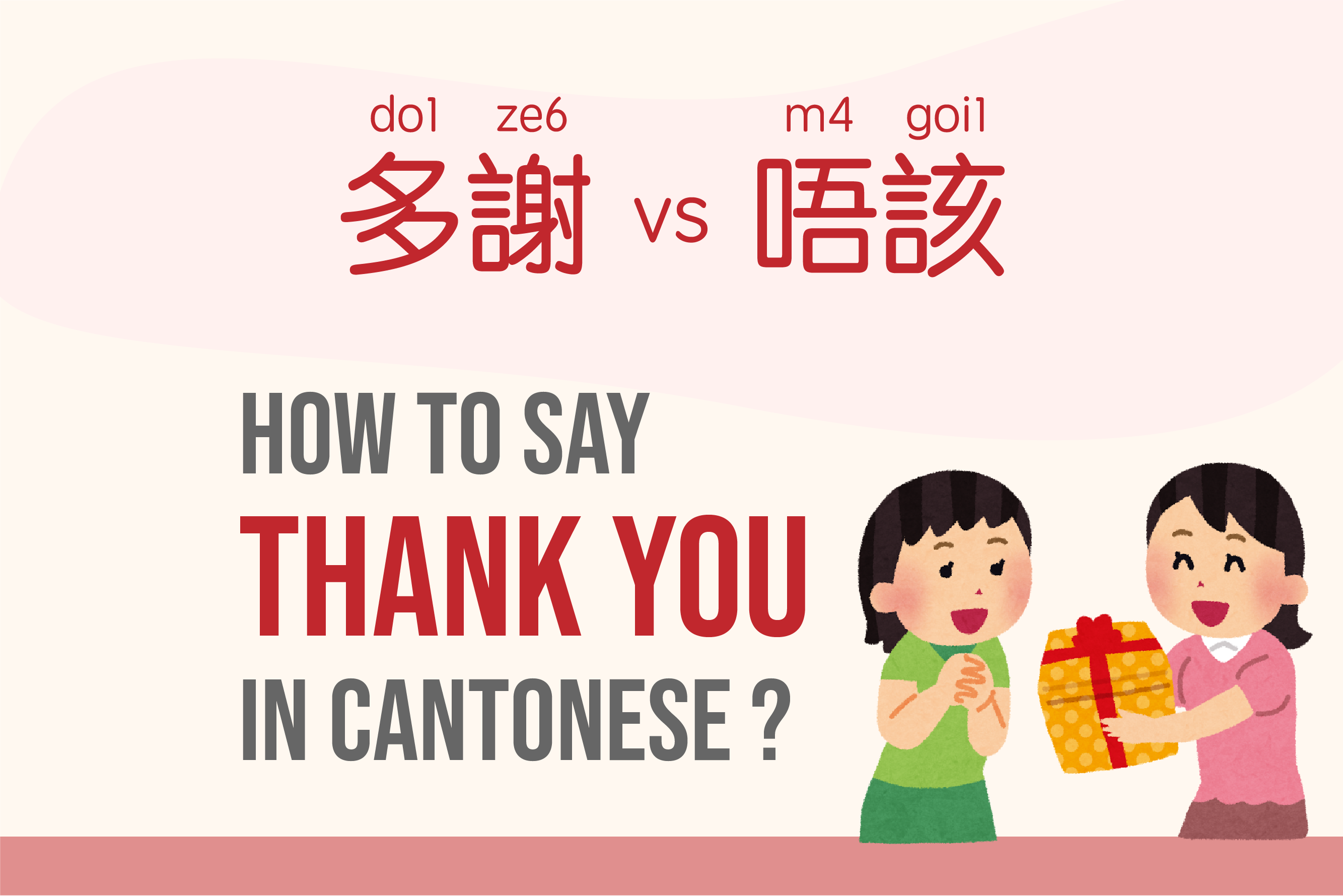Table of Content
How to say Thank you in Cantonese?
There are two ways to say thank you in Cantonese: 多謝 and 唔該. Sometimes they are interchangeable, but other times they are not. (Click on Jyutping romanization marker above each character to hear the audio!)
Literally, 多謝 means "many thanks" or "gratitude," while 唔該 means "should not (i.e., you shouldn't have to do this/help me)."
Generally, we use 多謝 to express gratitude when someone does something beyond their responsibility, such as giving you a present, providing significant help, or even saving your life.
In contrast, we use 唔該 to thank someone out of politeness, typically when someone offers you a small favor or when it's someone's duty to do something for you.
"Please" is almost always translated as 唔該, while "Thank you" can be translated to both 多謝 or 唔該 depends on the context.
Scenarios Comparing the Use of 多謝 and 唔該
Scenario | 多謝 | 唔該 |
|---|---|---|
English Equivalent | Thank you | Thank you / Please |
Waiter Serving and Bringing Your Food to the Table | ✘ unnatural because serving you is the waiter’s duty | ✓ serving you is his duty, so you say 唔該 to be polite |
Someone Helps You Pull the Door, Hold the Lift, Give You a Hand, Hand You Something, etc. | ✘ unnatural - although it's not their duty, it's not a very big help, so 多謝 is a bit too much in this case | ✓ not their duty but not a very big help, say 唔該 to show politeness |
Someone Gives You Significant Help at Work | ✓ use 多謝 to show sincere gratitude, especially if helping you is not part of their job duties - Example: 真係多謝哂你幫咗我咁多 (Thank you so much for helping me so much) | ✓ use 唔該 if the help is part of their job duties, still polite - Example: 真係唔該哂你幫咗我咁多 (Thank you so much for helping me so much) |
Someone Saved Your Life | ✓ use 多謝 because it’s a really big help | ✘/✓ a bit inappropriate since it’s a really big help, still possible to use if the person who saved you is a doctor or fireman where saving you is part of their duty, but 多謝 is always better |
Someone Gives You a Present | ✓ always use 多謝 since no one is obliged to give you a present | ✘ never use 唔該 otherwise it would sound like you take it for granted |
If you mistakenly say 多謝 instead of 唔該, it might sound a bit strange or unnatural, but not impolite. However, if you say 唔該 instead of 多謝, it can come across as taking something for granted and a bit impolite.
7 Variations of saying Thank You in Cantonese
多謝你呀
唔該你呀
Thank you you!
(You might hear some people saying "Thank you 你呀" in Hong Kong, which is influenced by this sentence structure where they directly translate 多謝/唔該 to "thank you" and add a following 你(you). This is because literally 多謝/唔該 does not contain the word "你(you)")多謝晒(你呀)
唔該晒(你呀)
Thanks so much! / Thank you so much!
(哂 means entirely, completely, to a full extent. 多謝哂/唔該哂 means thank you so much.)真係多謝晒(你呀)
真係唔該晒(你呀)
Really thank you!
(真 means real, true. 真係 means truly, really)(真係)好多謝你呀
(Really) Thank you very much!
(好 means very. 好 is never used with 唔該)
Expressing gratitude in other ways
Sometimes when people offer you a small favour, instead of saying 唔該, we express gratitude with 麻煩哂, which literally means "to bother so much". This phrase is used to acknowledge that someone took the time or effort to help you. By saying 麻煩哂, you're expressing appreciation by recognizing that you might have been a bit of a bother to them or may have inconvenienced them.
We commonly use 麻煩哂 when someone goes out of their way to assist, such as walking you to your destination, a colleague taking time out to help, or when someone carries something heavy for you.
Variation of saying 麻煩哂
麻煩晒呀
(I) have bothered (you) so much!麻煩晒你呀
(I) have bothered you so much!真係麻煩晒呀
(I) really have bothered (you) so much!真係麻煩晒你呀
(I) really have bothered you so much!
But remember, don't say 真係麻煩呀 without the 晒 or 你, because it can come across as "(You are / It is) so bothersome!"
